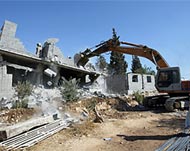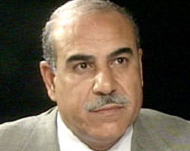Cement scandal highlights corruption
The Palestinian Authority’s general prosecutor has begun an extensive investigation into the so-called Egyptian cement scandal.

It is claimed that two Palestinian companies imported Egyptian cement and diverted it to Israel where it is believed it was used in the building of Israel’s separation wall.
A number of senior and junior PA officials may be indicted for their involvement in the affair which has already caused huge embarrassment to an increasingly beleaguered Palestinian Authority and seriously undermined its credibility, if not legitimacy.
The officials allegedly received grafts, bribes, kickbacks, or payments in return for their “silence”, falsifying documents and facilitating the “deal”.
Palestinian Authority leader Yasir Arafat, who is facing stiff and growing internal opposition to his autocratic style of governance, has remained tight-lipped about the scandal.
Last week, he told visitors from the West Bank that the affair was giving Israel and the US additional ammunition to attack and vilify the current Palestinian leadership.
The scandal, however, continues to snowball. It has galvanised the Palestinian public, to voice its widespread indignation at the PA’s failure to tackle corruption.
This indignation, say many observers, may evolve into violence as was seen recently in the Gaza Strip.
Redevelopment
The Egyptian cement affair began nearly a year ago when Egypt offered to sell the Palestinian Authority 420,000 tonnes of high-quality cement at symbolic prices ($12-15 a tonne) to prop up the Palestinian economy, badly battered by sustained Israeli invasions over the past four years.
 |
|
The imported cement was meant |
The cement was to be used to rebuild Palestinian homes and buildings destroyed by the Israeli occupation army, particularly in the Gaza Strip where entire neighbourhoods in Rafah in the south were bulldozed recently.
However, instead of dealing honourably with the goodwill gesture, a number of corrupt and well-connected businessmen, most likely in coordination with influential figures within the PA, were obtained a licence to import the cement from the PA Economy Ministry, headed by Mahir al-Masri.
The cement, which included several large consignments, was trucked through two border crossings between Sinai and the Gaza Strip. However, instead of going to the Gaza Strip, the cement ended up in the Israeli town of Ashkelon.
Counter claims
Al-Masri claims that the amount of imported cement, the subject of the controversy, did not exceed 65,000 tonnes.
The Palestinian Legislative Council carried out an investigation after an Egyptian newspaper, Al Arabi, disclosed business links between an Israeli businessman of German descent and a number of Palestinian companies, some affiliated to the PA.
One of the main authors of the investigation, Hasan Khraisha, is a deputy speaker of the council and a frequent critic of Arafat’s autocracy.
He told Aljazeera.net he had found authentic records showing the consignments amounted to 420,000 tonnes of high-quality cement.
He pointed out that the bulk of this amount (390,000 tonnes) ended up in Israel and was sold to an Israeli businessman who in turn resold it to Israeli contractors who were building the separation wall in the northern West Bank.
Reports
According to a report published on 31 July by the Ram Allah-based daily, Al-Ayyam, the PA businessmen who sold the cement to the Israeli businessman made profits ranging from $8 million to 9 million dollars. The businessman reportedly made similar profits selling the cement to Israeli contractors at $80 to $100 per tonne.
“This is a national treachery. It is a treasonous act to help build the racist wall at a time when Palestinian children are risking their lives and dying protesting the evil structure,” said Khraisha.
 |
|
Palestinian Authority Minister |
According to the legislative council report, three firms were involved. The main suspect is the Tarifi Company for Concrete Mix (TCCM), headed by Jamal Tarifi, a brother of Jamil Tarifi, the PA Minister of Civilian Affairs, responsible for liaising with Israel.
Prior to the creation of the PA in 1993, Tarifi occupied a prominent position in the Israeli army’s “civil administration” in the West Bank, and, thanks to his privileged contacts and connections, was able to amass huge wealth, winning highly profitable contracts from the Israeli occupation government in the West Bank.
Special treatment
And through the years, the Tarifis developed extensive business relations with Israeli firms, enabling them to make millions of dollars in profits, making use of the “special treatment” they received at Israeli checkpoints and roadblocks.
Hence, it was not a coincidence that the licence to import the cement from Egypt was prepared and signed rather surreptitiously at Jamil Tarifi’s home in Ram Allah, according to the PA’s comptroller Jarrar al-Kidwa.
It is now clear that PA chairman Arafat knew about the affair.
According to Khraisha, on 9 November a letter was sent to Arafat by al-Kidwa, informing him that an “open-ended” licence was being issued to the Tarifis to import the cement from Egypt.
Another letter reportedly notified Arafat that large amounts of the imported cement were being diverted to Israel by truck.
For reasons still unknown, Arafat refused to act, and al-Kidwa, whose appointment in his job has not been approved by the Legislative Council, refused to reveal to the council all subsequent official correspondences with Arafat’s office.
Wider issues
Officials in Arafat’s office refused to answer questions on the affair, arguing that the matter was being handled by the prosecutor general.
However fears remain that the matter will be whitewashed over as were numerous previous corruption scandals.
Notwithstanding its gravity, the current scandal represents only a small part of the huge corruption phenomenon inundating the Palestinian Authority.
Indeed, one could argue that corruption, with its various manifestations and expressions such as bribery, nepotism, favouritism, cronyism, kickbacks, pitfall profits and embezzlement and theft, served as the modus operandi of the PA operations since day one.
The phenomenon, say those who know, is so overwhelming that it will take Palestinian society many years to resolve, supposing there is the will and power to do so.